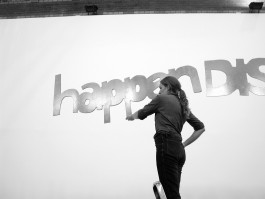
I’m Gonna Live Anyhow Until I die, 2012 HD 16'29'' loop
I’m Gonna Live Anyhow Until I die
Set to a whistling violin soundtrack containing improvised interpretations of songs by the 70s experimental musician Franco Battiato, Billing's video follows a group of Italian children running around the streets of Rome, seemingly doing what they like, having abandoned their parents at the restaurant, “Al Biondo Tevere” (the restaurant where Pasolini had his last meal before he died) After running through the park of the Roman Aqueduct, a courtyard in the 1930s working class district of Testaccio, and Ostia's Seadrome, the children finally arrive in an empty school in the centre of Rome, where time seems to have stood still. In a classroom that has been turned into storage they start to play around with troves of outdated educational tools and equipment as to try to understand what to do with them. Little by little, each child begins to compose black blots on sheets of drawing paper folded in half, creating blots that resemble those of the Rorschach test. Influenced by her time in Rome during protests against university reforms in 2010, Billing focuses the work on the future of the younger generation and the populist political will which has been undermining the education system. The work alludes to psychoanalysis, to Pier Paolo Pasolini and his thoughts about Italy’s social and cultural changes. Billing’s project also mines Italian history of progressive pedagogy, conducted by leading figures as Bruno Munari with his tactile workshops for kids as well as championing the early tradition of Italian filmmakers, who in their often biographical films about the 40s and 50s, focused on the freedom of children exploring their city as a way to reflect upon historical and the societal changes.






I’m Gonna Live Anyhow Until I die, 2012, HD 16'29'' loop
A film by Johanna Billing. Featuring: Palma Biadene, Eufrasia De Mattia, Andrea Folchi, Rocco Ciardo, Leonardo Faiella, Elena Lera & Gabriele Folchi, Pietro Faiella & Liliana, Massari, Francesca Valentiini, Roberta Sprizzi & Alessandro, Chimera Poppi, Cecilia Canziani and Davide Ferri. Director of Photography: Manne Lindwall. Second Camera Operator: Tiziano Casanova, Sound Recordist: Enrico Lenarduzzi. Still Photographer and Assistant: Lauren Brincat, Editing: Johanna Billing. Color grading: Swiss, Stockholm. Blu- Ray production: Filmtech, Stockholm. Project coordination: Cecilia Canziani and Stefano Collicelli Cagol. Produced by Fondazione Sandretto Re Rebaudengo, Turin and The MAC, Belfast, with support from Iaspis, the Swedish Arts Grants Committee’s International Programme. Special thanks to: Ristorante Al Biondo Tevere, Scuola Carlo Urbani, Fondazione, Giuliani, Adrienne Drake, Chimera Poppi, Davide Ferri, Cecilia Canziani, Lauren Brincat, Daniella Gallo, Roberto Panzironi and Angelo Forestan. Musical soundtrack recordings: Interpretations based on Cariocinesi and Mechanics (originally written and performed by Franco Battiato, from the album Fetus, 1971, Bla Bla records, Italy). Arranged by Johanna Billing along with musicians Andreas Söderström (whistling, guitar, percussion, synthesizer, pump organ), Patric Thorman (upright bass, electric bass, piano, vibraphone, percussion), Jonna Sandell (violin), Karl-Jonas Winqvist (glockenspiel, fender rhodes, cembalo, cymbals) and Christian Gabel (drums). Recorded and Mixed by Christian Gabel at Cobra Studio, Stockholm. Sound mix: Joachim Ekermann, Helter Skelter, Stockholm.
Works






















